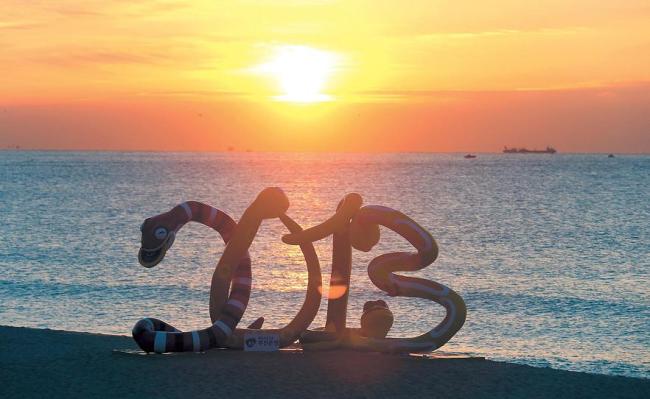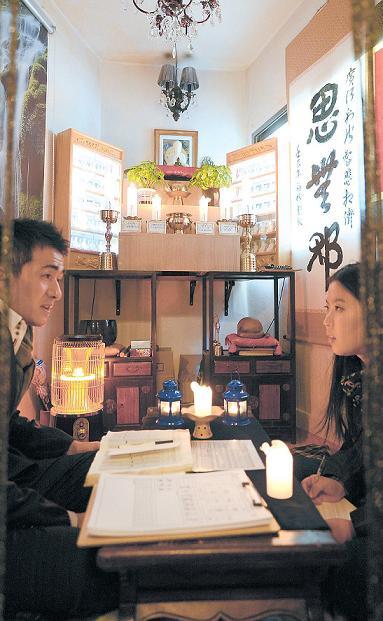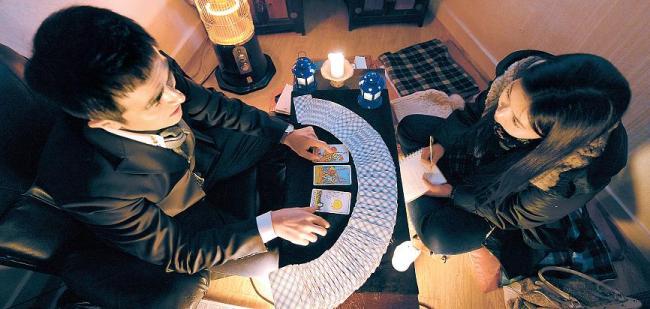The man wrote down the birth date and searched through his books. A little later, he scribbled down some Chinese characters and murmured a few words.
“So, it seems like you’ve had a tough year,” he said. “Your life has been led by other people’s noses. Your health hasn’t been too good and you have the urge to drop everything and run away only to be stopped by the harsh reality.”
The visitor, listening to every word, nodded.
“But I don’t think you should quit your job,” the man went on. “You fortune says you will get a promotion next year. Or you could have a great business opportunity only if you stay where you are.”
The visitor suddenly poured out his personal stories and problems.
“I normally don’t believe these things but I feel comfortable now,” he said. After the client left, the man said, “It usually ends up being a counseling session. People come here to not only foresee their fortunes but to spill their feelings with me.”
The man is Kim Yoon-hyu, a fortune-teller who runs Younu Saju and Tarot in Jongno, central Seoul. Kim, who worked at various places including the affluent Apgujeong-dong and the young and trendy district of Hongdae before finally settling in Jongno, said he can feel that more people are anxious about their future.
Fortune-telling can be about anything. While the elder generations are concerned about wealth, health and longevity, the relatively young are interested in getting a date, job or friendship.
“Even those who do not believe in fortune-telling take gunghap, or fortune of a couple, before getting married,” said 34-year-old Kim Ju-yeon, who admitted to have checked her gunghap before her marriage two years ago. “It was our parents’ idea but we agreed. We would have gotten married even if the results were not good but when we had it come out good, it definitely gave us some relief.”
Fifty-seven-year-old housewife Kim Youn-sun is moving in January, and asked a fortune-teller to set the date.
“I thought, ‘What if something bad happens on the day?’ It’s safer to just avoid any possibility of mishaps,” she said.
Kim Sang-hun, 34, had his son’s name chosen by a namist following saju.
“The person said he had too much fire in his fortune and suggested that I use Chinese characters symbolizing water to cool his fate,” he said.
And with the economy still sluggish, more people are depending on the service.
“People come to me and ask about very important questions ― whether they should shelve their business, whether to make investments, whether one should switch jobs or not,” fortune-teller Kim said, stressing that he and fellow fortune-tellers feel a great amount of responsibility in reading their clients’ fortune and advising about the future.
There is no certificate or test to qualify one as a fortune-teller. The knowledge is transmitted through apprenticeship or self-teaching.
These days, there are academies teaching tarot card reading and simple saju reading, where hundreds of people enroll to learn the “secret of life.”
“Even those who do not believe in ghosts or exorcism take fortune-telling relatively lightheartedly and try it,” Su-hyang, who teaches how to read tarot cards at local community centers. “Surprisingly, many of them are in their 20s or teens. They do not intend to be professional fortune-tellers but rather learn it for fun,” she said, stressing that fortune-telling isn’t for old or superstitious people.
Statistics
Those who study fortune-telling say it is more about statistical probability than anything else. One of the most popular forms of fortune-telling here is saju, or the analysis of the “four pillars.” With four basic pieces of information (the year, month, day and time of birth), fortune-tellers say that predicting the path of life of a person is possible.
“It condenses the nature into written characters and therefore to learn the saju is to learn about nature. Our ancestors have categorized the changes in nature according to timeline and linked it with human lives. It acknowledges that after spring comes summer and then autumn.
“And we believe that human lives could be made into a certain form of statistics in that way, proven patterns in life,” said Seohae, spokesman of the Korean Fortune-tellers’ Association.
He claimed that fortune-telling was regarded as a science throughout Korea’s history.
“In the Joseon era (1392-1910), fortune reading was part of the examination for government employment. It is different from divination and was regarded as an academic field.
“And we believe it is still one of the most ‘accurate’ means of reading one’s destiny.”
Fortune-teller Kim said people do not have to be too sensitive about whether fortune-reading is science, philosophy or anything else.
“It doesn’t seem fair for people to judge fortune-telling as a simple superstition, something to lure innocent people. On the other hand, I think it could be a good way to guide and remind people of living the good way and not doing wrong.”
Why?
Fortune-telling has many opponents, mainly those who believe that saju or other methods are useless or that reading one’s fortune can be a very bad idea.
“I don’t believe in fate. I don’t believe that reading it ahead could change anything or should change anything,” said skeptical 24-year-old university student Kim Anna.
Some religions, including Christianity, widely condemn fortune-reading as superstition.
“Our fortune is destined by God not the letter in some old books. It is not accurate and reading and believing it is inappropriate,” said Kim Pil-seung, a trainee pastor.
So why do people crave to have their fortunes read?
Cheon Jin-ki, director of the National Folk Museum, said the fear of uncertainty has pushed all kinds of people from all over the world to yearn for predictions of the future.
“Fortune-telling is one of the oldest and most common customs found all over the world. A long time ago, people used to guess the future with bones of animals or simple rituals but as data piled up some of them, like saju and Tojeongbigyeol, became more like statistics,” he said, explaining why saju or Tojeongbigyeol seem to pick up the past rather accurately from time to time.
Cheon, who holds a doctorate in shamanism studies and fortune-reading rituals, said Koreans have a great love of fortune-telling.
“For instance a large newspaper company was once bombarded with complaint calls when its columnist for the fortune-telling section died and they had to omit the column for several days. The management had to quickly appoint a successor in order to meet the readers’ needs,” he said.
“It is natural that people will have a good day if they are told that they have a good fortune and be cautious if they are warned about bad things,” said fortune-teller Kim. He noted that a considerable portion of his and his fellow fortune-teller’s clients are Christians.
“Someone told me that the nature of Christianity, predicting the future and working hard to achieve a good result or overcome obstacles, matches the basic philosophy of fortune-telling,” he said.
Cheon said nearly all fortunes could be good fortunes in the end and that people should not be fatalistic by a reading.
“If they can know a bad one, prepare against it and avoid it, it is also a good fortune,” he said.
By Bae Ji-sook (
baejisook@heraldcorp.com)









![[Today’s K-pop] Blackpink’s Jennie, Lisa invited to Coachella as solo acts](http://res.heraldm.com/phpwas/restmb_idxmake.php?idx=644&simg=/content/image/2024/11/21/20241121050099_0.jpg)
